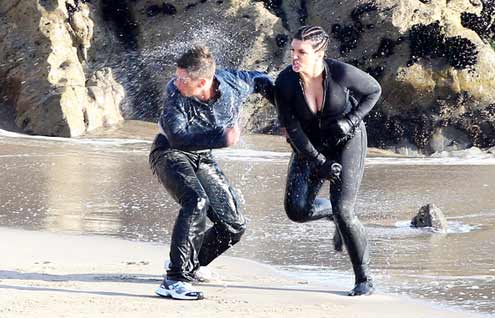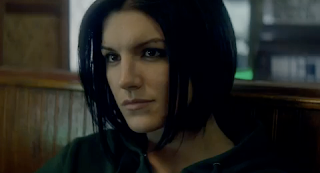When the movie Haywire
came out, there was a surprising and mixed reaction from the audience. On the
one hand, most people were pretty stoked to see a female protagonist action
movie that didn’t look fake (because it wasn’t), and on the other, it seems a
little awkward to watch a movie that is essentially just a lady getting beat up
for an hour and a half.
Both of these are pretty valid points, really. I mean, I
like me an action movie where I can see a really competent woman kicking butt,
but I also like knowing that she’s not being victimized. What to do?
As always, the solution is simple. I had to watch the
freaking movie and decide for myself. So, here goes.
But first, some backstory. Haywire was famously conceived when director Steven Soderbergh went
to see an MMA match and was able to witness champion fighter Gina Carano
demolish her competition. It occurred to him that she was very good at the
whole fighting thing, and not altogether bad to look at either. So he wrote a
screenplay for her, cast Ewan McGregor, Channing Tatum, Michael Douglas,
Antonio Banderas, Bill Paxton and Michael Fassbender, and went to work.
True story.
The plot of the film follows Mallory, a talented military
contractor who’s been set up by her old boss and is now being hunted down. It
turns out that she was set up because she broke up with him and decided to
leave his company, and he was jealous / afraid she’d steal all his business, so
he decided to have her killed. That’s not the important thing.
The important thing is that the movie is really just an
excuse for Gina Carano to beat up your favorite actors for an hour and a half.
Which she does. With gusto.
Now, it seems like it’s all smooth sailing from here, right?
If Carano is just a female action hero kicking butt, then why all the fuss?
She’s cool, and it’s just some mindless violence, right?
Not so fast. As with all things, we have to look a little
closer. The motivating factor in the movie is simple and a little skeevy:
revenge. Kenneth (McGregor) is mad at Mallory (Carano) because she left him.
At its heart, this story is about a relationship gone bad. This sexual
connotation, that Kenneth is killing Mallory because she turned him down, makes
the whole film feel a bit like a domestic dispute. The ugly kind, where someone
invariably ends up in handcuffs and the other person is in witness protection.
What saves this from being a really uncomfortable journey
into Lifetime movie territory is Mallory herself. Mallory is never a victim,
not even when Michael Fassbender is kicking her against a wall. She is always a
competent fighter, and she always comes out on top. So there’s that.
There’s also, though, a complete and utter lack of
sexualization in the violence. In most action movies, even ones with “strong
female characters”, the violence these characters face is extremely gendered.
They are choked so that we can see their heaving bosoms, or they are stabbed in
a way that is awfully reminiscent of rape, or they’re crippled in some ways.
What I’m saying is that in a lot of films, the violence
against women seems to be more a facet of them being women than of them being
enemy agents that need to be taken out. The violence factors in their
femininity and reacts accordingly. So a lot of it is very uncomfortable,
sexualized, the gasping last breath and the torn clothes and the smeared
lipstick. You see it a lot.
But Haywire isn’t
like that. It makes no bones about this being violence and aggression, and makes
it clear that Mallory can hold her own. Even when Gina Carano is squeezing
Michael Fassbender’s neck with her thighs (which was super impressive, by the
way), it never feels sexual. It’s just a fight.
This is not to say that Mallory is in any way a desexualized
character. She’s clearly comfortable with herself and her sexuality, and we
have multiple references to that fact in the film. Not so many as to be
uncomfortable, but enough so we get it. She walks around in a flowery bathrobe.
She has fitted shirts. Mallory is a woman who is totally chill with herself,
and is capable of taking out anyone who gets in her way. I like that in a
protagonist, don’t you?
There is one other beef I have with the film, which I do
feel the need to air. While it is beautifully shot, artfully told, and impressively
cast, it’s still lacking the one thing that would make me love this movie:
another woman with a speaking role. Or even on camera. Outside of crowd shots
and a waitress, there is only one non-Mallory female soul on screen for the entire
hour and thirty-two minutes of this film. And she’s a prostitute.
Look, I’m not expecting mountains here. I just wish that at
some point in her great revenge mission Mallory might have run into a woman who
wasn’t either sleeping with Antonio Banderas, or her. Once?
But that’s my biggest complaint. When it comes to a female
action hero that I actually really buy, and who I think is cool and worth
appreciating, Carano’s got it nailed. She might not be the world’s best
actress, but she gave Mallory a strength and certainty that most actresses
wouldn’t have. She made Mallory completely fearless, and therefore made the
violence nonsexual, and just impressive.
And terrifying.
 |
| By the time you get to the end of the movie, this is a viscerally enjoyable slap. |





I really enjoyed this movie, for the reasons you talk about here. I loved that Mallory was a character totally on her own terms; she had relationships that stopped when she decided, she took jobs that she wanted to take, and when men tried to punish her for those things, for making her own decisions, she took effective action, and was not punished by the narrative for doing so.
ReplyDeleteI definitely think that the decision of the narrative to vindicate her is probably what kept me engaged in the movie. She was the good guy, there was absolutely no shaming. Loved that.
DeleteTesting...
ReplyDeleteSorry; the last few posts I've tried to make have glitched.
DeleteBack to the post, I liked that Mallory's fights weren't easy. Too many action films fail to find the middle ground - despite it being a wide ground with a lot of varied and dramatic landscape - between insulating a heroine from all challenge and making her supposed competence an informed attribute with nothing much shown to back it up (the Tomb Raider 1 and 2 fallacies) Mallory won when she could have lost, and that's much more badass.
Definitely. A big problem I have with those other action movies is that the action itself tends more towards the dramatic than the realistic. Either it's a ridiculous fight because she's so much more badass, or it's a terrible fight because she's being strangled and losing awfully. It's so hard to hit the middle ground where it looks hard but she's still kicking ass.
Delete